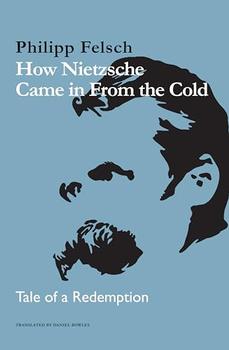
Tale of a Redemption
by Philipp Felsch
Nietzsche's reputation, like much of Europe, lay in ruins in 1945. Giving a platform to a philosopher venerated by the Nazis was not an attractive prospect for Germans eager to cast off Hitler's shadow.
It was only when two ambitious antifascist Italians, Giorgio Colli and Mazzino Montinari, began to comb through the archives that anyone warmed to the idea of rehabilitating Nietzsche as a major European philosopher.
Their goal was to interpret Nietzsche's writings in a new way and free them from the posthumous falsification of his work. The problem was that 10,000 barely legible pages were housed behind the Iron Curtain in the German Democratic Republic, where Nietzsche had been officially designated an enemy of the state. In 1961, Montinari moved from Tuscany to the home of actually existing socialism to decode the "real" Nietzsche under the watchful eyes of the Stasi. But he and Colli would soon realize that the French philosophers making use of their edition were questioning the idea of the authentic text and of truth itself.
Felsch retraces the journey of the two Italian editors and their edition, telling a gripping and unlikely story of how one of Europe's most controversial philosophers was resurrected from the baleful clutch of the Nazis and transformed into an icon of postmodern thought.
"Philipp Felsch has produced an enjoyable peek behind the scenes of one of the most important philological projects of the postwar era… stimulating and valuable." —Times Literary Supplement (UK)
"A delight … Erudite but not stuffily academic, crammed with fresh critical insights and much ironic humor, Felsch has the rare writing capacity to render the reading crackle with excitement." —Marginalia Review of Books
"[A]n accessible and interesting overview and survey of the 'redemption' of Nietzsche and his thought in the second half of the twentieth century." —Complete Review
"[A] terrific story." —The Spectator (UK)
"Nietzsche proclaimed himself 'the unfashionable one'. But few philosophers have suffered (or enjoyed) such dramatic changes of reputation, plunging in the aftermath of the Second World War because of the taint of Nazism and then rising again after rediscovery by Paris postmodernists. Focusing on two Italians who spent decades doggedly producing a comprehensive edition of Nietzsche's writing, Felsch has produced a quirky tour de force of reception history." —Sheila Fitzpatrick, Professor, Australian Catholic University, author of The Shortest History of the Soviet Union
"I became completely immersed in the lively and provocative panoramic tour of the widely diverse creative responses to Nietzsche radiating out from the circle round Colli and Montinari. 'Perhaps,' the author notes, 'because he himself acted out the antagonistic tendencies of the age, Nietzsche played the role of a canvas onto which the entire spectrum of twentieth century ideas could be projected.' Given that sentence, I would strike out the word 'perhaps.'" —Sue Prideaux, author of I Am Dynamite! A Life of Friedrich Nietzsche
This information about How Nietzsche Came in From the Cold was first featured
in "The BookBrowse Review" - BookBrowse's membership magazine, and in our weekly "Publishing This Week" newsletter. Publication information is for the USA, and (unless stated otherwise) represents the first print edition. The reviews are necessarily limited to those that were available to us ahead of publication. If you are the publisher or author and feel that they do not properly reflect the range of media opinion now available, send us a message with the mainstream reviews that you would like to see added.
Any "Author Information" displayed below reflects the author's biography at the time this particular book was published.
Philipp Felsch is Professor for Cultural History at Humboldt University of Berlin. He is interested in intellectual history and the history of science in the 19th and 20th centuries. His book The Summer of Theory. History of a Rebellion, 1960-1990 was published in 2021. An English edition of Wie Nietzsche aus der Kälte kam is forthcoming with Polity.
Your guide toexceptional books
BookBrowse seeks out and recommends the best in contemporary fiction and nonfiction—books that not only engage and entertain but also deepen our understanding of ourselves and the world around us.